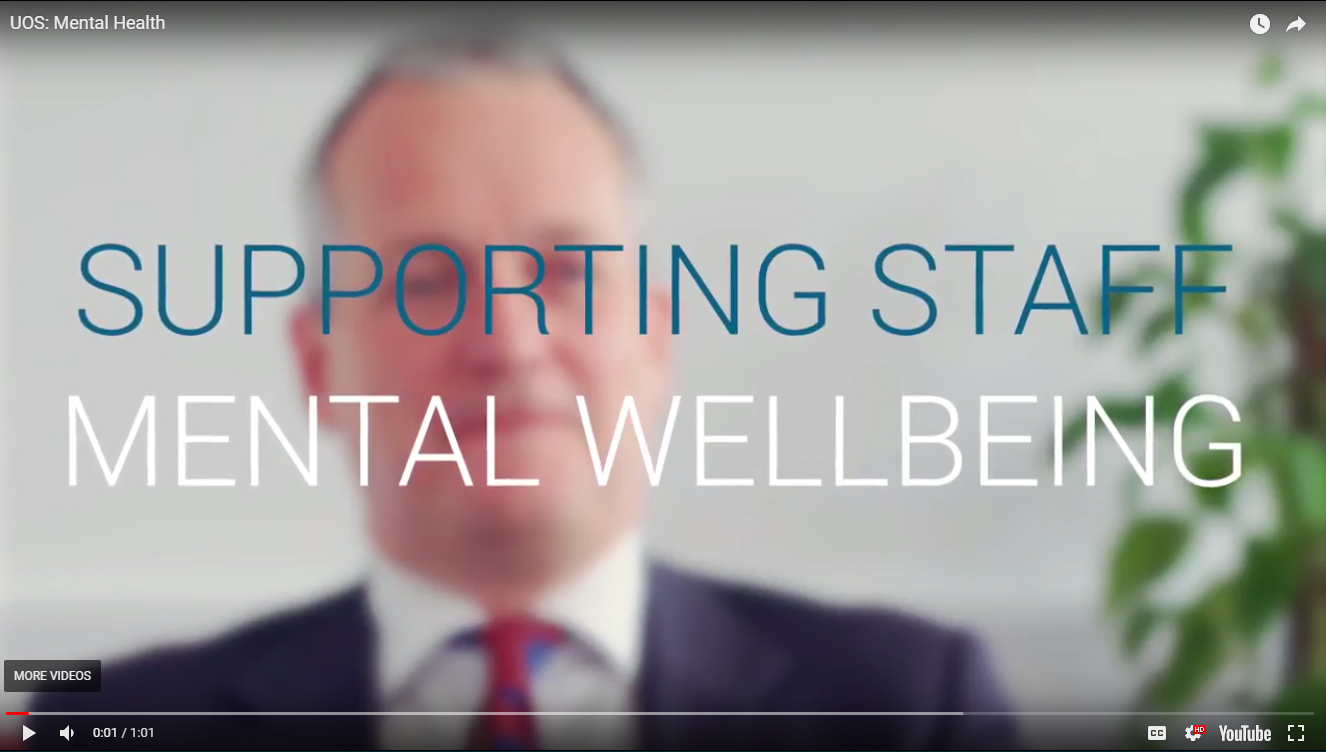Hartley News Online Your alumni and supporter magazine
Time to Talk day, held on Thursday 1 February by Time to Change, encourages conversation around mental health awareness. With this ever-increasing focus on the importance of discussing mental health, and the ongoing changes on our campuses, Southampton Connects Staff finds out about the University’s commitment to supporting staff mental health, and talks to our own psychology and mental health experts about mental wellbeing in the workplace, particularly during times of organisational change.
Ian Dunn, Chief Operating Officer, is the University’s Executive Champion for mental health. He says: “We recognise that staff and students can best realise their potential when they are in good mental and physical health. Therefore, people’s mental health is really important to the University.
“It is also well understood that the uncertainty that comes with organisational change, or any sort of major change during our lives, can cause mental health distress. Acknowledging this ‘up front’ is one of the ways the University can help to address it.
“Communicating the nature of the change, why we’re having to make changes and how we can all be part of and contribute to the change journey is fundamentally important in terms of staff wellbeing during the process.”
Cathy Day, our Director of Health, Safety and Risk, is the University’s wellbeing lead. Her team works with other directorates and faculties to improve the wellbeing of both staff and students, and takes forward University-wide wellbeing campaigns.
“Change is inevitable, so it’s not a case of not doing change – it’s the way we do it that makes the difference,” says Cathy.
It’s important when we’re going through any kind of change programme that we follow good practice. We want to make sure change is something we’re doing with staff, rather than to them.
University support
Through ongoing investment, the University is enhancing the support available to staff during this period of change and beyond. “Our mental health provision has been increasing and improving over the last months and years,” says Ian. “We’ve strengthened our Health and Wellbeing team within the Health, Safety and Risk Directorate, and we’re putting in place training and additional resources. Examples of this include a face-to-face training programme which is currently underway, helping line managers to recognise and manage stress within their teams.
Cathy adds: “I believe the University’s role is to create a culture of openness in which people feel able to talk about, and address, mental health issues. To do this we provide a range of tools for managers, enabling them to open up discussions about mental health with their teams, and supporting them to identify and address early signs of adverse mental health with staff. We also provide resources that enable staff to monitor and manage their own mental health.”
Valuing colleagues and ourselves
Our responses to change are hardwired, as Dr Nick Maguire, Associate Professor in Clinical Psychology, explains. “We have evolved to be sensitive to uncertainty – for our ancestors change could mean life-threatening risk – so it can be hugely anxiety provoking.” During organisational change, one way in which this anxiety can manifest itself is through self-doubt.
“We all want to be valued and seen as competent, but when people are worried about their jobs, they tend to question their own value,” says Nick. “If their role changes during a restructure they may perceive this as a negative judgement on their performance in their previous role.
If someone’s job is changing, a key thing that managers can do is to ensure the staff member knows what they do well in their current job, why those skills are needed in their new role, and reassure them that they are not expected to be perfect in their new job straight away.
James Wilson, Lecturer in Mental Health and a mental health nursing specialist, agrees that taking time to recognise one another’s contributions is crucial in creating an emotionally positive working environment. “It takes seconds to write an email or go to someone’s desk to acknowledge something they’ve done well or thank them for a piece of work, and it can make a big difference to how they feel.”
Building resilience
For staff members at all levels, developing an awareness of their own mental health, and how they can maintain good mental health, can help them cope better during periods of change.
“The guiding principles of mental health recovery work include personal responsibility, education and self-advocacy,” says James.
“These principles can be applied to mental wellbeing in the workplace more generally. It’s about taking responsibility, with the support of others, for your own mental health, learning about yourself so that you can avoid triggers for stress, or recognise early signs of poor mental health, and reaching out for additional help if you need it.”
Another way in which staff can enhance their resilience is by building supportive networks. Sandra Walker, Lecturer in Mental Health and a member of Health Sciences’ Staff Wellbeing Committee, explains. “My work in community wellbeing shows the importance of social networks for people’s mental health, and this is equally relevant in the workplace. Academics, particularly those involved in research, can become isolated, so it’s important for staff to build colleague networks to gain a sense of being part of a team.”
Supportive and empowering leadership, that demonstrates transparency and fairness, is also essential for people’s wellbeing at work. Sandra says: “From our clinical work we know that to have a sense of wellbeing, people need to feel that they have control over their own circumstances, that their opinion counts and that processes and procedures are effective and fair. This is just as true for staff within any workplace.”
Tackling stigma
Ultimately, the University’s aim is to create an environment in which openness about mental health issues becomes the norm. “The stigma around mental health is reducing but it still exists nationally, in our local communities and in the University,” says Ian.
Having open conversations with colleagues, line managers or the Health and Wellbeing team will help to overcome that stigma. That’s really our objective for this year; to start moving mental health into everyday conversation.
Useful links
Contact the Health and Wellbeing team
Visit the Mental Wellbeing intranet pages
Employee Assistance Programme (free, confidential telephone support and counselling)

